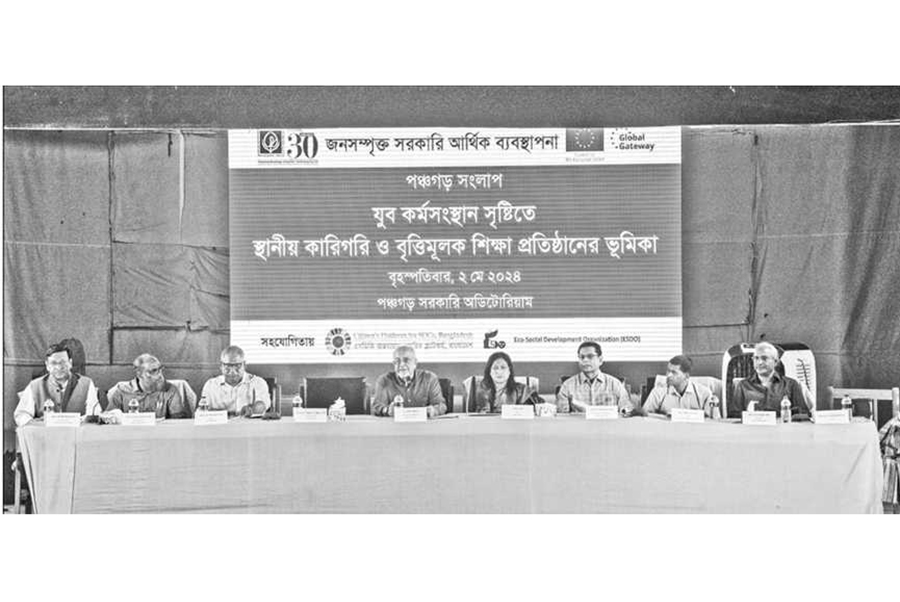Low funding, outdated tools impede technical education
Study shows as CPD calls for shifting mindset to improve quality

SAJIBUR RAHMAN, back from Panchagarh
Published :
Updated :

More than 35 per cent of participants in a recent study found that Bangladesh’s Technical and Vocational Education and Training (TVET) is hampered by inadequate funding.
Only 4.5 per cent of the total education budget was allocated to TVET in the FY 2023-24, according to the study, while just 44.5 per cent of the allocated budget for technical and vocational education was spent in FY 2021-22.
Insufficient infrastructure was identified by 31.5 per cent of students as another major obstacle to the advancement of TVET.
The findings were presented at a dialogue on Thursday on the role of local technical and vocational educational institutions in creating youth employment. The Centre for Policy Dialogue (CPD) organised the programme in Panchagarh.
The event was supported by the European Union, the Citizens’ Platform for SDGs Implementation, Bangladesh, and the Eco-Social Development Organisation (ESDO).
Dr Towfiqul Islam Khan, a senior research fellow at CPD, presented the study.
Dr Debapriya Bhattacharya, distinguished fellow at CPD, chaired the event, while Mohd Naimuzzaman Bhuyian, member of parliament (MP), was the chief guest.
Professor Dr Mustafizur Rahman, distinguished fellow of CPD, Jakia Khatun, mayor of Panchagarh Municipality and Abdul Hannan Sheikh, chairman of Panchagarh Zilla Parishad, also spoke at the function.
Local students, their parents, professionals from various fields, political representatives and local government officials also participated in the dialogue.
Speakers and participants at the event emphasised the critical need to shift societal mindsets to improve the quality of technical education in Bangladesh.
They observed that prevailing social attitudes act as a significant barrier to the growth of technical education nationwide.
They also pointed out that local TVET institutions still rely on outdated machinery and equipment, hindering graduates’ ability to secure the jobs they aspire to.
Besides, the need to introduce technical education in various madrasas was also emphasised, as graduates are falling behind in securing their desired jobs.
According to Dr Debapriya Bhattacharya, Bangladesh risks falling behind and fostering division if it fails to deliver quality education.
He emphasised the need to change public perceptions and consolidate government efforts to effectively advance the country’s TVET sector.
“The government has allocated only 4.5 per cent of the total education budget to TVET. However, we are not fully utilising this allocated budget, which is hampering the quality of education,” he said.
The study found that around 42 per cent of surveyed students consider participation in TVET education to be not very accessible, while 44 per cent found it somewhat accessible.
A total of 200 current and former students participated in the survey.
The survey showed only 18 per cent of students anticipate becoming entrepreneurs after completing their training. Some 25 per cent of the students aspire to be skilled technicians upon graduation.
Speaking at the dialogue, Dr Mustafiz said, “Our societal mindset remains unchanged. It is projected that 30 to 40 per cent of the current job landscape will cease to exist in the future.”
“Coordination among relevant private and public institutions and agencies remains a major problem. The government can play a key role in facilitating this collaboration,” he added.
He emphasised the importance of accountability and follow-up to ensure improved productivity from the government’s ongoing projects and initiatives.
Local lawmaker Naimuzzaman Bhuyian said, “The need for technical education is undeniable. I prioritised it highly in my election manifesto.”
Highlighting the importance of youth education, he mentioned that individuals aged 15 to 25 now comprise 35 per cent of the country’s population.
“We openly acknowledge that our children pursue education with the aim of securing employment. Nowadays, many enrol in universities solely with the intention of becoming a BCS cadre officer,” he added.


 For all latest news, follow The Financial Express Google News channel.
For all latest news, follow The Financial Express Google News channel.